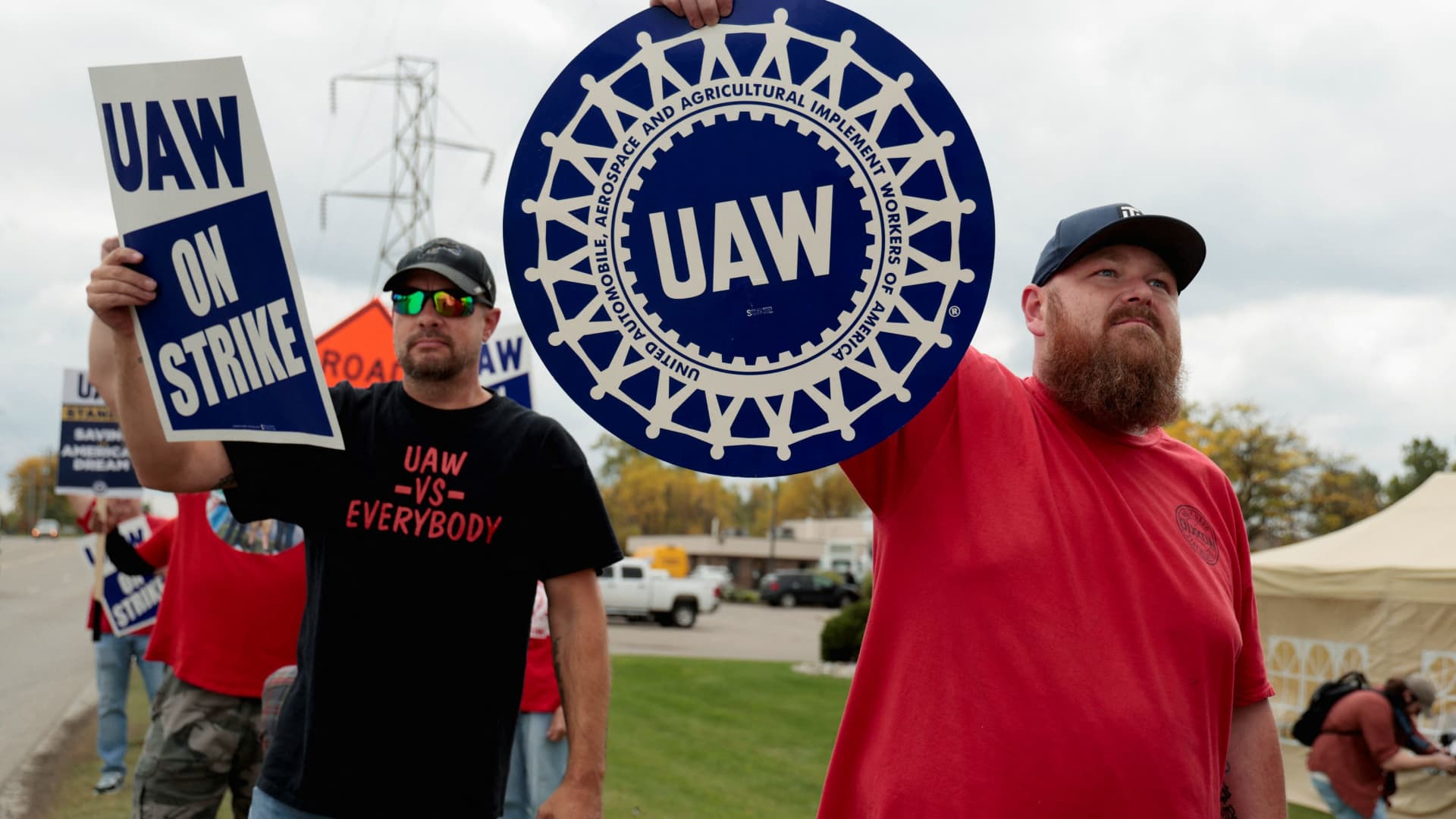DETROIT — United Auto Workers members with Volvo Group-owned Mack Trucks will vote this weekend on a tentative agreement that falls significantly short of what the union is demanding in negotiations currently being held with Detroit automakers.
The Sunday vote by roughly 3,900 union members could test the willingness of workers to ratify a lesser deal compared to raised expectations set by UAW President Shawn Fain for hourly pay increases, equal pay for equal work, inflation protection and, potentially, shorter work weeks.
While Mack Trucks is a separate company and a different part of the union than the section that covers members with General Motors, Ford Motor and Stellantis, some workers were expecting that they would receive similar increases and benefits as their union brethren at the Detroit automakers.
“In my opinion, the master contract is not horrid. It’s not a bad contract, but it’s nowhere near what we were expecting,” a 12-year Mack Truck worker at the company’s Lehigh Valley Operations in Pennsylvania told CNBC.
The worker and several other UAW members with Mack Trucks who asked not to be identified due to fear of retribution from the union or company said they plan to vote against the deal. Their reasons included the tentative agreement not meeting expectations, the length of the deal being a year longer than before and the pay increases and bonuses not being enough to offset inflation or reward them for working through the Covid-19 pandemic.
“When we were going in, we were following basically like the automakers,” the worker said. “They’ve changed some things for the better but, in my opinion, not enough.”
The Mack Trucks tentative agreement varies by location and job but for many workers, it includes a roughly 19% wage increase over the five-year deal, including 10% upon ratification; $3,500 ratification bonuses; increased 401(k) company payments; and other benefits. It does not include the elimination of wage tiers (it only has a one-year reduction that would bring the steps to five years); re-instatement of traditional pensions; cost-of-living adjustments to battle inflation; or shorter work weeks.
The Mack Trucks tentative agreement isn’t a bad deal, but it’s not close to the 40% pay increase, inflation protection, work/life balance and other bonuses and benefits Fain has set as the standard for negotiations with the Detroit automakers. For the Detroit automakers, pay tiers also have been at least cut in half from eight years — a time frame Fain, a former auto worker, said Friday was “not acceptable.”
Mack Trucks and UAW announced the tentative agreement early Monday, followed by releasing “highlights” of the deal later in the week to members. Neither UAW nor Mack Trucks have publicly released the tentative contract ahead of employee meetings to detail the agreement and voting this weekend.
Another Mack Trucks worker descried the deal as “disgraceful” and an “insult” compared to their expectations and what’s currently being negotiated by UAW international leaders with the Detroit automakers, also known as the Big Three.
“We are low man on totem pole, and we are getting no backing from international,” said a more than 10-year material technician. “They are just pushing this [tentative agreement] through so they don’t have to deal with us while the Big Three are negotiating.”
UAW declined to comment on the comparison in contracts between Mack Trucks and the Detroit automakers. Mack Trucks President Stephen Roy, in a Monday statement, said the tentative agreement ”would deliver significantly increased wages and continue first-class benefits for Mack employees and their families,” while keeping the company competitive.
Another veteran worker at Mack Truck’s Lehigh Valley Operations in Pennsylvania said they were not expecting the same raises and benefits as what’s being negotiated with the Detroit automakers, but they were looking for more than what’s in the current tentative agreement.
“We pay dues just like the Big Three,” said the roughly 20-year Mack Trucks employee who has worked several positions with the company. “We should get at least the same type of negotiation options.”
One of the “options” mentioned by Mack Truck workers was conducting target strikes like what’s happening at the Detroit automakers to fight for additional wages and benefits, specifically, the reinstatement of cost-of-living adjustments to combat inflation.
“My honest opinion, I thought we were going out on strike because there’s no COLA in it,” the worker said. So, in five years, we’re going to be right back in the same hole.”
Marick Masters, a business professor at Wayne State University in Detroit who specializes in labor issues, said it’s important to note that Mack Trucks is not in the same position as the Detroit automakers. However, inflated expectations from union members can be a problem.
“The UAW can be a victim of its own success,” he said. “They get a good deal here and everybody’s going to say we want the same thing … but they operate in different industries or different segments of the larger industry that have different financial considerations, and I think that’s just what you’re seeing here.”
